She Roars: Updates from the Celebration of Women at Princeton
Iris Samuels ’19 was on hand for Ellie Kemper ’02’s speech at the closing dinner (Oct. 6)
On Saturday, actor and author Ellie Kemper ’02 entertained Princeton alumnae as the She Roars conference concluded. She spoke about her time at Princeton, her experiences working in television, and what she learned from her field hockey coach.
Kemper discussed the many “confident, strong women” she has worked with, including Tina Fey, who serves as her director and boss on the show Unbreakable Kimmy Schmidt, and Kemper’s mother, who graduated from Princeton in 1972.
Dorothy Jannarone Kemper ’72 entered Princeton as a transfer student the first year women were allowed to attend. Like Ellie, Dorothy wrote and acted in the Triangle Club. “My mom set the standard for how a woman should behave in the world,” Kemper said. “She’s a strong, opinionated, brilliant woman.”
What were your favorite moments and takeaways? Share your experiences with other PAW Online readers. A selection of comments may appear in an upcoming issue.
Sharing a section of her new memoir, My Squirrel Days, Kemper explained what she learned from an encounter with her field hockey coach, Beth Bozman: “Women are at their best when we are helping other women.”
“We listen to one another,” Kemper said. “We don’t interrupt one another. Having a tough conversation with an intimidating woman showed me that women find strength from each other.”
“It has been a difficult week,” Kemper said, reflecting on the current political climate. “It occurred to me that one of the most important things we can do right now is to celebrate all of the phenomenal women in our own lives.”
“And that is what we are going to do tonight,” Kemper continued. “I’m going to ask you to do this — I’m sorry if it’s embarrassing — but we have to roar!” Kemper roared into the microphone, encouraging the audience to do the same.
Kemper ended by thanking President Eisgruber ’83 and the Princeton community “for valuing women, for listening to what we have to say.”
“Thank you for promoting us and believing in us, and for realizing you would be totally lost without us.”
Sonia Sotomayor ’76, left, and Elena Kagan ’81 addressed the She Roars conference on Friday; Iris Samuels ’19 reports (Oct. 5)
The marquee event of this weekend’s She Roars conference, a conversation with Supreme Court Justices Sonia Sotomayor ’76 and Elena Kagan ’81, drew about 3,000 alumni to Jadwin Gym Oct. 5. Sotomayor and Kagan spoke about their careers and their experiences at Princeton with moderator Heather Gerken ’91, dean of the Yale Law School.
“There is an enormous amount of polarization and partisanship, and the court has always been understood as a neutral arbiter,” Gerken said, asking the justices how they approach these divisions on the bench.
“This is a really divided time,” Kagan agreed. “Part of the court’s strength and part of the court’s legitimacy depend on people not seeing the court the way they see the rest of the governing structures of this country now,” she added. Instead, Kagan said the court should be seen as “somehow above the fray.”
“It’s an incredibly important thing for the court to guard. This reputation of being fair, of being impartial, of being neutral, and of not being simply an extension of the terribly polarized political process that we live in,” Kagan added.
“We have to rise above partisanship in our personal relationships,” Sotomayor said. “We have to treat each other with respect and dignity and with a sense of amicability that the rest of the world doesn’t always share.”
“People too often don’t realize that we agree on a lot,” Kagan said. “Half the time we are unanimous.”
The justices also spoke about the personal relationships they develop with one another. “We live in this world where it is just the nine of us,” Kagan said. “If you hold grudges or if you have a bad relationship with one of your colleagues, then in the next case you have not much of a chance of persuading that colleague.”
“Our openness about respecting one another is an example that is important to both maintain and promote,” Sotomayor said. “I try to find the good in every person,” she said. “If you start from the proposition that there is something good in everybody, it’s a lot easier to get along with them even when you disagree vehemently.”
Speaking about dissents and disagreements between the justices, Kagan said there are different kinds of dissents. “There are dissents where you think the majority has gotten it wrong,” she said. “But every once in a while, you see a case that stands in for a bigger issue … and those dissents have to be written a different way.”
“You have to convince the reader of the moral justice in your opinion,” Sotomayor said.
As women on the court, Sotomayor and Kagan said they are able to hold their ground. “None of us are shrinking violets,” Kagan said. “We don’t take a backseat role.” However, they did admit to challenges they faced as they developed their careers. “I don’t think you can be part of the working world without having a moment when you are treated different because you’re a woman,” Sotomayor said. “We still have a long way to go, but it’s a lot shorter distance from when I started out.”
Before becoming Supreme Court justices, both Sotomayor and Kagan had illustrious and varied careers. “All the most fun things I did in my career, were mostly the result of serendipity,” Kagan said, advising audience members to “be open to opportunities.”
“There is no occupation or profession that doesn’t give you an avenue to do good work,” Sotomayor said.
“Different jobs have different constraints that go along with them,” Kagan said. “I track my jobs in terms of emails received,” she added. “When I was dean of Harvard Law, I used to get 400 emails a day. And when I was Solicitor General I got about 40. And now, when I get an email it is such an exciting moment in my life.”
But Kagan said that serving on the Supreme Court has not changed the way she lives her life. “I can do most things without making a scene,” she said.
Sotomayor, on the other hand, had some caveats. “I won’t wear shorts anymore,” Sotomayor said, smiling. “Now that I’m a justice, I’m careful at beaches,” she said, saying that some people take photographs of her. “Even when you tell jokes, people take you seriously.”
Discussing Princeton, Sotomayor and Kagan agreed it had a transformational impact on their lives.
“It has affected everything that has come since. It opened the door to opportunity for me in a way that I never imagined,” Sotomayor said. However, she admitted to feeling out of place when she first arrived. “There is a comfort in meeting people who are more like you. I obviously got used to Princeton, but it does take a while.” Sotomayor was a member of the third graduating class that allowed women to enroll. “I had many classes where I was the only woman in the room,” she said. “To see a gymnasium filled with alumni — and to see all the women students out there — it’s gratifying.”
Sotomayor said she finally felt like she belonged when she became a University trustee. “It took lots of years to be convinced to become a trustee, and when I finally did, I was so glad I had,” she said. “It’s my hope that more women in this room will aspire to that, because it’s still important to have women trustees who want to participate actively in growing this institution.”
“I got the best education at Princeton and made the best friends,” Kagan said. “People really forced me to think about issues and problems in not simpleminded ways. And to keep pushing the envelope, and to keep thinking about different points of view.”
“Look at the opportunities you have at a place like Princeton,” Sotomayor said. “But it won’t be valuable unless you are willing to take chances and do those new things that might otherwise scare you.”
Managing Editor Ray Ollwerther ’71 on Nancy Weiss Malkiel’s discussion of the dawn of coeduation at Princeton (Oct. 5)
Alumnae of Princeton’s first coed classes were recognized with hearty applause during a She Roars session on the arrival of coeducation at Princeton in 1969. Nancy Malkiel, professor emerita of history and former dean of the college, asked the “pioneering women” from the classes of 1970 to 1973 to stand in front of several hundred alums in Jadwin Gym, praising them for their “courage and sheer gumption” in enrolling at the University and “for making Princeton better and stronger in every way.”
Malkiel recounted key points from Keep the Damned Women Out, her history of how coeducation arrived at elite U.S. and British schools in the late 1960s, saying that Princeton’s decision to admit women was not an act of altruism but “to improve the educational experience of men.” But despite fierce opposition from alumni and antipathy from some faculty and students, she said, “Princeton coeducated more successfully” than any of its peers. “Nothing in the traditions of this place would have predicted such an outcome,” she said. While the University made numerous mistakes and it was “very tough for women at the beginning,” she said, progress since then has made Princeton “one of the most welcoming and effective institutions in the world for women.”
Asked about issues that remain to be addressed, Malkiel cited the need for more women faculty, a gender imbalance among graduate students, the lack of undergraduate and graduate-student women in some academic departments, and a question “that is still open” about the participation of female students in the highest-profile leadership positions.
Editor Marilyn H. Marks *86 checks in from Terri Sewell ’86’s morning talk (Oct. 5)
Is there anyone more energetic than Terri Sewell ’86? Maybe not. Sewell — the only Democrat and only African-American in Alabama’s Congressional delegation — delivered a rousing breakfast talk at the She Roars conference Friday morning that was part storytelling and part call to action, encouraging alumnae to become civically engaged, to speak to those who hold different political opinions, and to run for office themselves.
In one of the most moving parts of her talk — which drew two standing ovations — Sewell recounted how, in 2015, a parade of national officials greeted then-103-year-old Amelia Boynton Robinson in ceremonies commemorating the 50th anniversary of Bloody Sunday. Robinson was severely beaten that day in 1965 when she and others attempted to march across the Edmund Pettus Bridge from Selma — Sewell’s hometown — en route to Montgomery in pursuit of their right to vote.
Recalling the commemoration, Sewell said Eric Holder followed several African American leaders who wanted to acknowledge Robinson’s contributions and courage, each telling her: “I stand on your shoulders.” Finally Robinson replied: “Get off my shoulders and do your own work!”
Sewell said: “It’s an amazing legacy that we’ve inherited. What are we going to do with it?”
Francesca Billington ’19 reports on a panel discussing ideological diversity on campus (Oct. 6)
Current students and alumni spoke on the importance of ideological diversity on Princeton’s campus Saturday morning during a panel called “Why Princeton Is Special,” sponsored by the James Madison Program.
“The University is fundamentally failing at fostering free and open discourse if the learning that is meant to taking place here — in and out of the classroom — is not as diverse or robust as it could be because some conservatives are too intimidated by the social repercussions that result from voicing our opinions,” said panelist Allison Berger ’18, who spoke on experiences as outspoken conservative on campus, receiving hostility from students who did not agree with her views.
Some liberals on campus want to engage with opposing views but don’t yet know how or where to do that, said panelist and president of College Democrats, Shafaq Khan ’21. She organized a meeting between College Democrats and College Republicans.
Panelist Elly Brown ’18 compared campus discourse and conversation to the comment sections of online articles. She urged students and faculty to foster more in-person dialogues between people of opposing ideologies so students “see each other as humans who can disagree on issues but nonetheless are not enemies with each other.”
Ellie Schwartz ’20 chats with alumnae at She Roars (Oct. 5)
Jill Broder Steinberg ’85, left, and Abigail Ratner Simhus ’85 were roommates all four years at Princeton.
Of her undergraduate experience, Steinberg says, “I can’t even describe the academic enrichment because it was so profound.”
Simhus calls She Roars “unbelievable”: “The speakers were phenomenal. It’s been empowering. It is a shame current students are not part of it.”
Helen Doo ’73, left, and Helen Zia ’73 were on campus during the early days of coeducation at Princeton.
Doo transferred to the University from Vassar after her sophomore year. “There were much more opportunities in terms of my courses and activities here,” she says. “I found a group of friends and had a very good experience here.”
As Zia recalls, “There were many people who did not want us here. We were part of a tiny handful of pioneers. We experienced the joy of breaking barriers. At the same time, there was a lot of old ways that had to change, a lot of antagonistic situations. There was always Me Too stuff. We all have stories to tell.
“This conference is a way for those of us who came in the early days to see how much progress has been made. There are still things that need to be done that needs to be carried on by the new generation.”
From left, Deesha Sarma ’13, Marla Jalbut ’13, and Erin Byrne ’13 attended Friday’s conversation with Supreme Court Justices Sonia Sotomayor ’76 and Elena Kagan ’81.
Sarma says, “It was really neat to have two women who shared my experiences at Princeton, as a woman and woman of color, talking about them … . Princeton sticks with you.”
Jalbut was interested to hear how Sotomayor and Kagan “spoke so much about how the Court should be above politics, because that’s not the way it is now.”


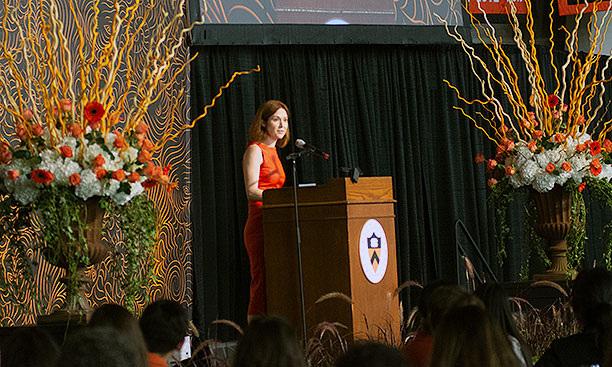
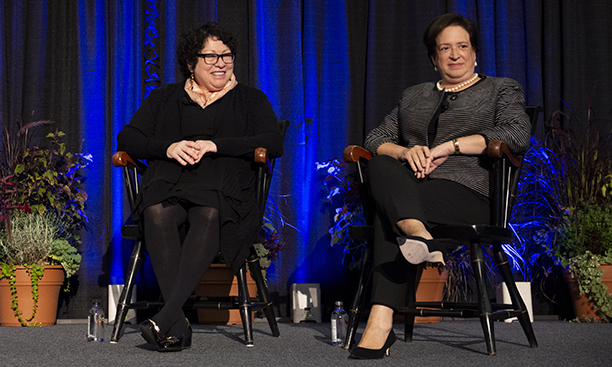
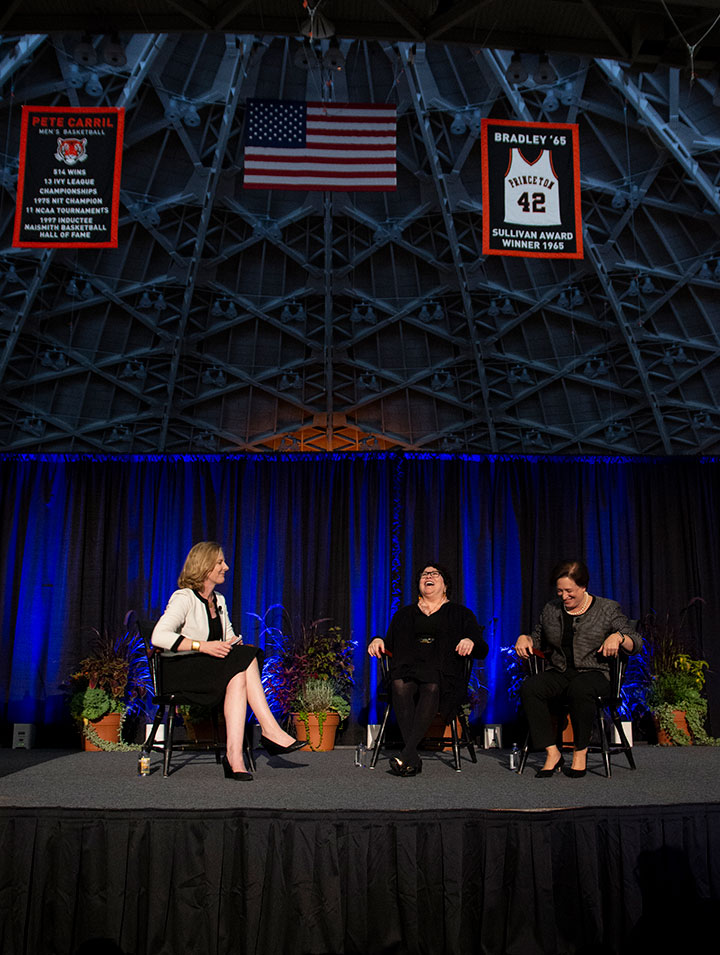

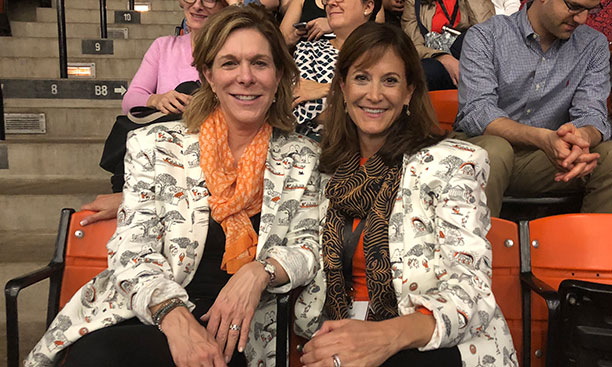
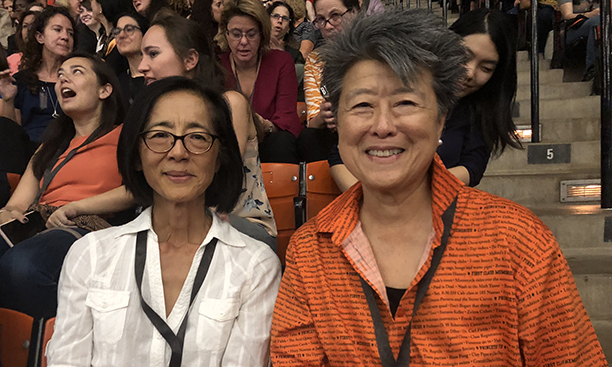
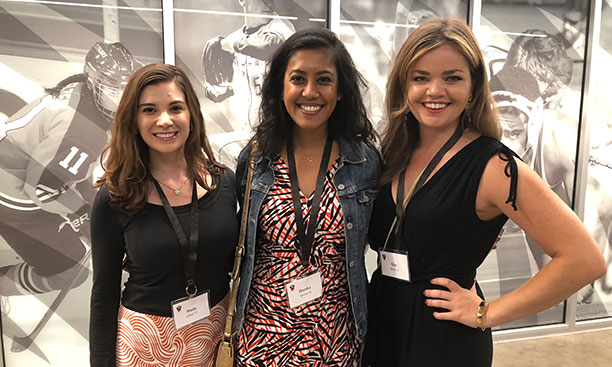









3 Responses
Meghan Duval ’93
7 Years AgoA Strange Choice at She Roars
I got right into the She Roars mode by starting off the conference in McCosh 46 with a panel discussion on the experiences of current female undergraduates and grad students. Just to see the diversity in the panel and moderators was immediately inspiring. Things only got better and better and ended with the small audience representing every decade of Princeton women asking questions and sharing their experiences. In this happy uplifted mood, I made my way over to Alexander Hall, Richardson Auditorium, where the record seemed to skip and start playing backward. The hall was so full, I had to sit behind a column from where I could not see the stage. So when the opening remarks immediately went into the introduction of Douglas McGrath '80, I kept waiting for the punch line. Surely this was a joke - the first major speaker at the conference was the epitome of generations of the all white male tradition? And he was here to tell 3,300 women about adapting women's literature about women's life??? His 1950s TV sitcom-style humor and the fact that the first movie clip he showed was the whitest of white women discussing attracting men did not help.
I am truly grateful to all of the work that Jennifer Daniels and the committee did to put the conference together. There were many, many fabulous moments, and Douglas McGrath is beyond need for my approval. However, I think it was a strange and unfortunate choice to have any man open this conference. What I heard over and over again from the women on campus was the need to see other women in positions of leadership and power. Could we have not at least opened our own conference with such a woman? I do not care if she was speaking about the most mundane and technical of issues; it would have been better. The fact that 3,300 women sat in Richardson Auditorium and laughed pleasantly along with no comment and that one older alumna reasoned to me that the organizers chose McGrath because there was no female equivalent of him did not help.
From London, She Roars Inspired
The She Roars conference couldn't have fallen on a more perfect and poignant time for so many of us. I joined the conference after a long flight from London, UK where I currently reside. For me, it was an ideal moment, as I've been in a transitional moment in my career while also feeling swept up not only in America's current political climate, but also in life abroad, and I was so eager to jump into conversations with fellow Princeton women. After recently receiving my PhD in international relations at the London School of Economics last year, the She Roars "Liberating the PhD: Diverse Career Paths with a Doctorate" panel was the perfect opportunity for me to jump into conversations with fellow Princeton women to help tease out many of the anxieties, questions and curiosities I currently face in exploring next steps in my career. Complementing such targeted panels with a range of sessions on issues unrelated to my studies, exploring journalism, wellness, leadership and other areas were a welcome respite from the more specific advice I was seeking and provided many undiscovered sources of information and inspiration. Topping this off with meals shared with dear '10 friends alongside Princeton '73 and '74 women who told remarkable stories of persistence and drive -- all with an incredible sense of humor and camaraderie-- was more than I could have expected from just three short days.
Rachel George '10
Rageorge8788@gmail.com
Twitter @Rageorge88
Oona Miller Hanson '97 s'96
7 Years AgoSexism and Silence Open the She Roars Conference
The opening plenary session of the 2018 She Roars conference was a disappointing start to an otherwise inspiring event.
Although many alumnae were apprehensive about having a man deliver the kick-off presentation at a women’s conference, I imagined Douglas McGrath ‘80 -- who has made his career telling women’s stories on stage and screen -- might be uniquely positioned to address the national conversation around gender equality in the wake of the #metoo and Time’s Up movements, particularly during the week of the Kavanaugh vote and the one-year anniversary of the Harvey Weinstein story breaking in the Times. Instead, McGrath avoided these issues altogether and even delivered sexist jokes.
McGrath had several opportunities to weigh in on timely topics of grave concern to his audience. His talk focused heavily on his work as the writer and director of the film adaptation of Jane Austen’s Emma, produced by Weinstein. Although McGrath told entertaining tales of making a particular scene in the award-winning film (including a lively description of the butterfly wrangler -- assuring us “there’s always a guy for that” when specific needs arise on a film set), he never acknowledged the predatory elephant in the room.
While intended to be funny, his lengthy tale of sitting next to President Clinton during a White House screening of Emma further demonstrated a lack of thoughtfulness. McGrath vividly described the way the president ate popcorn: “the most disgusting thing I’ve ever seen -- and I’ve seen childbirth!” The tone-deaf punchline received polite but awkward chuckles from the audience, compelling women to participate in his misogynistic humor (not to mention the fact that many of us were thinking, Is eating with gusto really the repulsive behavior for which Bill Clinton should be ashamed?).
During the Q & A, Rachel Jackson '11 asked McGrath about the fact that he’s a man telling women’s stories and what might be done to empower women’s voices in the arts; he didn’t seem to know what to say and quickly moved on to the next question.
I don’t expect one man to speak for all men or to have solutions to our country’s challenges around gender equality, but I invite McGrath to get a second chance to respond to the alumna’s important question -- and to offer his honest reflections about discrimination, harassment, and sexual assault in his industry.
Sincerely,